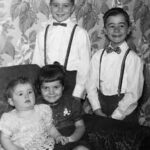We'd love to have you access this content. It's in our members-only area, but you're in luck: becoming a member is easy and it's free.
Already a Member?
Not a Member Yet?
My new memoir, French Boy (due out in the summer of 2023), is about my childhood. Much about this time in my life has a context that is unique and consequently different from that of my contemporaries. This memoir has a place in the world of memoirs, and I want it to find that place, […]
My new memoir, French Boy (due out in the summer of 2023), is about my childhood. Much about this time in my life has a context that is unique and consequently different from that of my contemporaries. This memoir has a place in the world of memoirs, and I want it to find that place, but writing it has also brought up some pain which I did not want. Once again, I found out that there is pain in telling the truth.
My parents were thoughtful and loving people so their behavior towards me is not an issue. I am not writing about a reprehensible or shameful experience. I am dealing with a more average pain that is both little for the world and big for me.
[Free Membership required to read more. See below. ]This post is one of over 500 informative, well-written articles we have made available to you on this site.
We’ve contributed to your writing success; now we ask you to contribute to the expansion of the memoir conversation.
By reposting this article on your blog or website or reposting on your favorite social media, you will inform your fellow memoir writers of the programs and services—many for free like the blogs—that are available at TheMemoirNetwork.com.
Thanks for your generosity. You rock.


No comments yet.